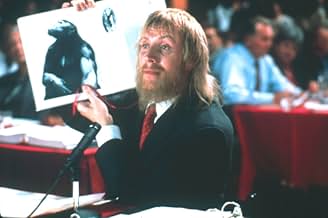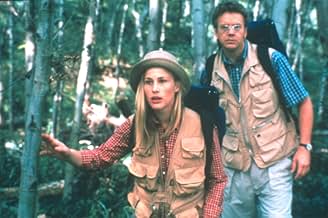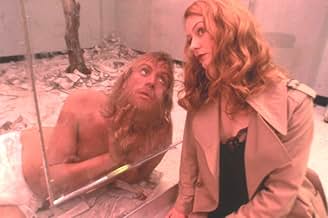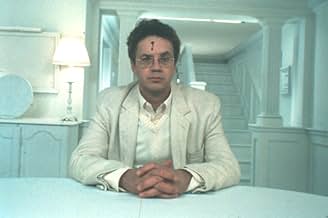Human Nature
- 2001
- Tous publics
- 1h 36min
NOTE IMDb
6,4/10
19 k
MA NOTE
Une femme est éprise d'un homme amoureux d'une autre femme, et tous trois ont des vues sur un jeune homme qui a grandi dans une famille de singes.Une femme est éprise d'un homme amoureux d'une autre femme, et tous trois ont des vues sur un jeune homme qui a grandi dans une famille de singes.Une femme est éprise d'un homme amoureux d'une autre femme, et tous trois ont des vues sur un jeune homme qui a grandi dans une famille de singes.
- Réalisation
- Scénario
- Casting principal
- Récompenses
- 2 victoires et 2 nominations au total
Stanley DeSantis
- Doctor
- (as Stanley Desantis)
Chase MacKenzie Bebak
- Young Nathan
- (as Chase Bebak)
Avis à la une
There are many different kinds of movies. This is one of a rare species: a film with a message. Other people might hear different morals when watching it, or none at all, which is okay, too. But to me, Charlie Kaufman wants to tell us "deprive an adolescent of his right to a natural sexual development and you create a violent outburst".
Director Michel Gondry presents you a satire. The comedic element comes from grotesque, which is a relief after the all too juvenile teen movies that pathetically try to generate laughter by gross embarrassment and over-emphasized sounds of rearward body functions.
Instead of telling the story of average parents struggling to deal with their teenage son, you will find a) a woman with excessive body hair (in my view representing all your everyday discontent with your true self), and b) a man with an obsessive compulsion to demand perfect table manners (which of course stands for the misuse of parental power to force his unfounded views onto his "son")
The adolescent in this film being troubled by his sexual awakening is not the usual cool, hip, handsome high-school kid that all the real cool, hip,... okay-looking high-school-kids don't want to identify with anyway. It's Puff (Rhys Ifans), a young man who was raised by a deranged father to believe that he is an ape. This brings him in a situation not totally unlike that of a (human) teenager: somehow like the other humans, but being told that he's all weird and that everything he knows is suddenly wrong and bad. Eager to learn and please, he tries his best to conform, but to "control", that is, to ignore and deny his sexual curiosity, is just asking too much and he is forced to resort to deception.
It always amazes me how we Americans keep wondering why we have about 200x more shooting deaths than (other) civilized countries. One reason can be seen in the ratings for this particular film. Europe: around 12 (France: PG), USA: R, for it's hard to spot nudity. This is ironic confirmation of what the film is trying to draw attention to: by demonizing Puff's sexuality and using violence to suppress it, both Nathan and Lila become guilty of creating violence in turn.
For viewers who find this to be what this movie is about, I strongly recommend Michael Moore's Bowling for Columbine (Title 0310793 here on IMDB.com) only it is not so funny, because it's a documentary.
Director Michel Gondry presents you a satire. The comedic element comes from grotesque, which is a relief after the all too juvenile teen movies that pathetically try to generate laughter by gross embarrassment and over-emphasized sounds of rearward body functions.
Instead of telling the story of average parents struggling to deal with their teenage son, you will find a) a woman with excessive body hair (in my view representing all your everyday discontent with your true self), and b) a man with an obsessive compulsion to demand perfect table manners (which of course stands for the misuse of parental power to force his unfounded views onto his "son")
The adolescent in this film being troubled by his sexual awakening is not the usual cool, hip, handsome high-school kid that all the real cool, hip,... okay-looking high-school-kids don't want to identify with anyway. It's Puff (Rhys Ifans), a young man who was raised by a deranged father to believe that he is an ape. This brings him in a situation not totally unlike that of a (human) teenager: somehow like the other humans, but being told that he's all weird and that everything he knows is suddenly wrong and bad. Eager to learn and please, he tries his best to conform, but to "control", that is, to ignore and deny his sexual curiosity, is just asking too much and he is forced to resort to deception.
It always amazes me how we Americans keep wondering why we have about 200x more shooting deaths than (other) civilized countries. One reason can be seen in the ratings for this particular film. Europe: around 12 (France: PG), USA: R, for it's hard to spot nudity. This is ironic confirmation of what the film is trying to draw attention to: by demonizing Puff's sexuality and using violence to suppress it, both Nathan and Lila become guilty of creating violence in turn.
For viewers who find this to be what this movie is about, I strongly recommend Michael Moore's Bowling for Columbine (Title 0310793 here on IMDB.com) only it is not so funny, because it's a documentary.
"Human Nature" is just one example of what happens when you combine a script written by Charlie Kaufman, the directorial talents of Michel Gondry, and a stellar cast featuring Tim Robbins, Patricia Arquette, and Rhys Ifans.
The movie may not be up to par with Kaufman's other works such as "Being John Malkovich" and "Eternal Sunshine Of The Spotless Mind," but it does great at utilizing the usual elements that make a great Kaufman script: Eccentricity, great dialogue, and sometimes dark humor.
This film also happens to be director Michel Gondry's first directorial effort. While the film does lack some of the trademarks that Gondry would use in the other films of his career, (specifically his manipulation of the mise en scene) this film is, after all, his first directorial effort. Sometimes directors don't immediately find out what their main style is on their debut films.
Then you have the performances of the cast. Tim Robbins and Patricia Arquette shine in their respectful places as the male and female leads, but I believe Rhys Ifans deserves a bit more love. His performance as Puff is one that I feel is wildly underrated.
Overall, "Human Nature" is worth a go, especially if you like anything with Charlie Kaufman or Tim Robbins or Patricia Arquette written on it.
The movie may not be up to par with Kaufman's other works such as "Being John Malkovich" and "Eternal Sunshine Of The Spotless Mind," but it does great at utilizing the usual elements that make a great Kaufman script: Eccentricity, great dialogue, and sometimes dark humor.
This film also happens to be director Michel Gondry's first directorial effort. While the film does lack some of the trademarks that Gondry would use in the other films of his career, (specifically his manipulation of the mise en scene) this film is, after all, his first directorial effort. Sometimes directors don't immediately find out what their main style is on their debut films.
Then you have the performances of the cast. Tim Robbins and Patricia Arquette shine in their respectful places as the male and female leads, but I believe Rhys Ifans deserves a bit more love. His performance as Puff is one that I feel is wildly underrated.
Overall, "Human Nature" is worth a go, especially if you like anything with Charlie Kaufman or Tim Robbins or Patricia Arquette written on it.
"Human Nature" is a comedy written by "Being John Malkovich's" Charlie Kaufman and it doesn't fail to carry the distinct aroma of his previous film. The film explores our so-called "primal urges" and our need to live naturally with deep consideration of those urges.
Patricia Arquette plays Lila Jute, a human naturist who has a little problem. She is suffering from a hormonal balance that causes her to be abnormally covered with body hair. While this does not pose much of a concern for her personally, it does for everyone else and more specifically, men. After getting fed up with the world, she decided to live in the forest amongst the animals and write best-selling nature books. However the animal in her begins to miss the precious company of men and so she returns to civilization. Lila shaves her body hair and begins a somewhat odd relationship with Nathan Bronfman (Tim Robbins). Nathan happens to be an etiquette scientist who tries to teach mice and Lila table manners. One day, Lila and Nathan come across an untamed man (Rhys Ifans) who was raise by a father who believed himself to be a monkey. That man is later nicknamed Puff. The Puff creature happens to be the perfect subject for Dr. Nathan Bronfman as he changes Puff's wild ways to more more cultivated conduct. Lila is left torn between lying about her "human nature" or embracing her urges and running wild.
Perhaps I'm as prude as Tim Robbins's character, however there is no appreciation of the refined gross-out humor in my sight. It appears as though the crude humor found its way into the movie for no reason other than the fact it could. Luckily the film makes up for that in very unique cinematography. The interesting camera angles and settings take away a bit from the numerous unnecessary masturbation jokes and bodily fluid gags. There were many other ways that such a creative team of filmmakers could have coped with them in a more substantial manner and prevented their detraction of the finer aspects of the movie.
The finer aspects of the film include the brilliant acting from some of the somewhat less familiar faces in Hollywood. Actress Patricia Arquette creates a character that is believable, originative and daring. She inhibits Lila with great ease and manages to push all the right buttons to make her tick just the right way. Rhys Ifans fills Puff's shoes with more content than expected. While he is able to add much to the film due to his comedic nature, there are a few points in the film where Rhys is able to show even greater depth. Both actors make great counterparts.
At times obscene and at others strange, the comedy manages to tackle some more thought-provoking issues, outside of humping. "Human Nature" discusses issues of evolution, the human desire to blend in and what it really is that makes us human. It walks through a somewhat slow and unstructured journey that imprints the difference between civilization, monkeys and mankind.
Despite its charms, "Human Nature" is not what it could have been. It does not live up to its potential because the filmmakers decided to make too many hollow & irrelevant stops and too few truly important ones. In the end, "Nature" is daring, well acted, unique, intelligent in spirit and very very crude.
Grade: C
Patricia Arquette plays Lila Jute, a human naturist who has a little problem. She is suffering from a hormonal balance that causes her to be abnormally covered with body hair. While this does not pose much of a concern for her personally, it does for everyone else and more specifically, men. After getting fed up with the world, she decided to live in the forest amongst the animals and write best-selling nature books. However the animal in her begins to miss the precious company of men and so she returns to civilization. Lila shaves her body hair and begins a somewhat odd relationship with Nathan Bronfman (Tim Robbins). Nathan happens to be an etiquette scientist who tries to teach mice and Lila table manners. One day, Lila and Nathan come across an untamed man (Rhys Ifans) who was raise by a father who believed himself to be a monkey. That man is later nicknamed Puff. The Puff creature happens to be the perfect subject for Dr. Nathan Bronfman as he changes Puff's wild ways to more more cultivated conduct. Lila is left torn between lying about her "human nature" or embracing her urges and running wild.
Perhaps I'm as prude as Tim Robbins's character, however there is no appreciation of the refined gross-out humor in my sight. It appears as though the crude humor found its way into the movie for no reason other than the fact it could. Luckily the film makes up for that in very unique cinematography. The interesting camera angles and settings take away a bit from the numerous unnecessary masturbation jokes and bodily fluid gags. There were many other ways that such a creative team of filmmakers could have coped with them in a more substantial manner and prevented their detraction of the finer aspects of the movie.
The finer aspects of the film include the brilliant acting from some of the somewhat less familiar faces in Hollywood. Actress Patricia Arquette creates a character that is believable, originative and daring. She inhibits Lila with great ease and manages to push all the right buttons to make her tick just the right way. Rhys Ifans fills Puff's shoes with more content than expected. While he is able to add much to the film due to his comedic nature, there are a few points in the film where Rhys is able to show even greater depth. Both actors make great counterparts.
At times obscene and at others strange, the comedy manages to tackle some more thought-provoking issues, outside of humping. "Human Nature" discusses issues of evolution, the human desire to blend in and what it really is that makes us human. It walks through a somewhat slow and unstructured journey that imprints the difference between civilization, monkeys and mankind.
Despite its charms, "Human Nature" is not what it could have been. It does not live up to its potential because the filmmakers decided to make too many hollow & irrelevant stops and too few truly important ones. In the end, "Nature" is daring, well acted, unique, intelligent in spirit and very very crude.
Grade: C
10Eli-18
'Human Nature' will inevitably be reviewed in comparison to 'Being John Malkovich', and the comments will be along the lines of 'less coherent', 'not likely to be as commercially successful', etc. But should these be reasons to NOT see this movie? Only if you want to miss the most intelligent movie to come out since BJM. Forget 'A Beautiful Mind', which gives the appearance of intelligence by flaunting pseudo-guru math, but was just another sappy tale of 'the triumph of the human spirit'.
What makes 'Human Nature' and BJM a cut above the usual cinema drivel, is that they actually attempt to get into some serious philosophical issues. BJM delves into personal identity, while 'Human Nature' digs even deeper into the realm of our underlying... human nature. What makes human nature any better than animal nature? civilization? language? manners? And do these distinctly human features actually make us better, or just different, or different in a bad way... i.e. by making us lead dual lives, tearing our originally united being into inharmonious halves (subjective/objective)? And can we simply unite our duplicitousness by forgetting language, civilization, and manners... by returning to nature? Or, with a philosopher who gets an intensional nod in 'Human Nature', Wittgenstein, are we stuck in language, forever banished from the garden of eden?
This movie raised all of these questions, and more, for me... which is what I expect out of a good movie: not only does it entertain us, but it invites us to join in the entertaining. By posing these questions, it challenges us to answer them, and to ask our own questions of it... which means that we have to see it again in order for it to continue the dialogue. Now that's what I call interactive movie-going. Philosophy has started some great stuff in history: religion, government, science. So I think that's its not asking too much for movies to engage in philosophical debates and trying to include the audience, rather than thinking of the audience as fodder for the box office.
What makes 'Human Nature' and BJM a cut above the usual cinema drivel, is that they actually attempt to get into some serious philosophical issues. BJM delves into personal identity, while 'Human Nature' digs even deeper into the realm of our underlying... human nature. What makes human nature any better than animal nature? civilization? language? manners? And do these distinctly human features actually make us better, or just different, or different in a bad way... i.e. by making us lead dual lives, tearing our originally united being into inharmonious halves (subjective/objective)? And can we simply unite our duplicitousness by forgetting language, civilization, and manners... by returning to nature? Or, with a philosopher who gets an intensional nod in 'Human Nature', Wittgenstein, are we stuck in language, forever banished from the garden of eden?
This movie raised all of these questions, and more, for me... which is what I expect out of a good movie: not only does it entertain us, but it invites us to join in the entertaining. By posing these questions, it challenges us to answer them, and to ask our own questions of it... which means that we have to see it again in order for it to continue the dialogue. Now that's what I call interactive movie-going. Philosophy has started some great stuff in history: religion, government, science. So I think that's its not asking too much for movies to engage in philosophical debates and trying to include the audience, rather than thinking of the audience as fodder for the box office.
This is further proof that writer Charlie Kaufman is probably the most unique writer in show business and he's developing into quite the cult figure. This odd story is about a woman named Lila (Patricia Arquette) who's body is covered with hair and at the age of 20 she retreats into the wilderness to hide and she writes nature books to make ends meet. But after some time she decides to leave and get electro-dialysis because she gets horny. Her friend hooks her up with a shy and repressed scientist named Nathan (Tim Robbins) and they hit it off. Then while on a nature walk they discover a man (Rhys Ifans) living in the wilderness who thinks he's an ape. They take him back to Nathan's lab where he is going to teach him to be human. Only Kaufman could come up with such a ridiculous story and make it redeemable. The film is directed by Michel Gondry who is known for directing several of Bjorks videos and he makes his feature film debut here. I think the film works because Kaufman makes sure the viewer is not to take this seriously but at the same time the humor is not presented in an over the top way like some cheap attempt at laughs. The humor is more dry witted and it reminded me a little of something Albert Brooks might have thought of. Another thing I enjoyed was the performance of Arquette. She's the core of this film and it should remind everyone that she is able to carry a film by herself and that she's a very underrated actress. I've always been a big fan of hers and she's just not used in films enough. She does appear nude but she seems fine with it and she should, she looks great. The film wants to ask the question about sex and the difference between humans and animals and the environment we are all brought up in. When the film was over I wasn't sure what to make of it but once I found out that Charlie Kaufman wrote the script an immediate smile came across my face. Knowing he was behind this odd comedy seems to make all the sense in the world!
Le saviez-vous
- AnecdotesMany of the scenes in the forest are allusions to or recreations of scenes in the Björk music video "Human Behavior", also directed by Michel Gondry.
- GaffesPuff was raised by a madman who never taught him basic language skills or anything about human life. So how does he know the story of being stolen from his mother's apartment?
- Citations
Nathan Bronfman: What is love anyway? From my new vantage point, I realize that love is nothing more than a messy conglomeration of need, desperation, fear of death and insecurity about penis size.
- ConnexionsFeatured in Una Especie de Cine-Teatro Novelesco (2006)
- Bandes originalesHair Everywhere
(2001)
Music and Orchestrations by Jean-Michel Bernard
Lyrics by Charlie Kaufman
Performed by Patricia Arquette
Meilleurs choix
Connectez-vous pour évaluer et suivre la liste de favoris afin de recevoir des recommandations personnalisées
- How long is Human Nature?Alimenté par Alexa
Détails
Box-office
- Montant brut aux États-Unis et au Canada
- 705 308 $US
- Week-end de sortie aux États-Unis et au Canada
- 297 340 $US
- 14 avr. 2002
- Montant brut mondial
- 1 574 660 $US
- Durée1 heure 36 minutes
- Couleur
- Mixage
- Rapport de forme
- 1.85 : 1
Contribuer à cette page
Suggérer une modification ou ajouter du contenu manquant

Lacune principale
By what name was Human Nature (2001) officially released in India in English?
Répondre






































